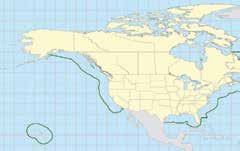Emission control Areas will lead
to economic hardships for Alaskans
By Marleanna Hall
On August 1st the Environmental Protection Agency (EPA) will begin enforcing a new regulation requiring more expensive fuel for marine transportation. The new regulation, which was adopted through the creation of a special North America Emission Control Area (ECA), will go in effect in the coastal waters of the United States, including Alaska, and will negatively impact all areas of Alaska.
Marine freight transportation is critically important to Alaska. In fact, 85% of all goods Alaskans consume are shipped through the Port of Anchorage. In addition to food, construction equipment, military equipment, mining equipment, oil and gas equipment are all shipped via marine transportation.
In a recent article, Totem Ocean Trailer Express stated the higher price fuel will result in an 8% increase in total operating costs. These costs will be passed on to consumers, in effect, imposing an 8% shipping tax on Alaskans. To make matters worse, the EPA will require even more expensive fuel by 2015. The second tier could result in an increase of 16% - 20%.
The ECA will increase the cost of living and increase the cost of operating a business in Alaska.
The real problem, however, is that the ECA regulations are not backed up by any proven or documented scientific studies. Even the State of Alaska Department of Environmental Conservation has not documented any ambient air quality issues related to shipping. In addition, the EPA did not conduct any economic analysis of the potential negative effects of the ECA on Alaskan communities. Modeling done in Los Angeles is not sufficient justification to impose such impacts upon Alaskans.

While the Emission Control Area only extends to the western side of
Cook Inlet in Alaska, the impact from the increased cost for shipping will be felt statewide.
Alaska’s tourism industry will also be severely impacted, with the likelihood of some cruise ships turning to alternative destinations in the years to come. In 2010, after a 2006 State cruise ship tax was put in place, ships turned away from Alaska, lowering the number of visitors by 140,000 passengers a year. The resulting job loss was over 5,000 in Alaska.
The ECA impact will likely be two to three times as high. Estimated fuel prices show the impact upon the cruise industry will be approximately $140 million annually.
RDC board member, AlaskaACT steering committee member, and Skagway Street Car Company President Steve Hites recently disseminated information warning Alaskans on ECA. Here is an excerpt from his comments:
“Very few Alaskans even know that this is happening. The EPA got the North American ECA approved into regulation through the International Maritime Organization, not through Congress where it would have been publicly debated. It is a questionable interpretation and application of the Clean Air Act.
“The regulations will affect all ocean shipping, and they will hit both cruise ships and cargo ships. But because the much higher fuel costs will be passed on to the consumer, the real effect – economically – will be felt by the American people.
“No economic studies have been done about how the ECA will impact any aspect of the American economy.
“But more troubling, the ECA specifically targets one group of Americans – those of us who do not live in the contiguous United States – and it imposes unreasonable economic burdens upon us. Alaska, Hawaii, the U.S. Virgin Islands, and Puerto Rico will all be directly and disproportionately affected, with discriminatory economic hardships put on every man, woman, and child in these non-contiguous places.
In addition to Hites concerns, the State of Alaska on June 27th sent a letter to EPA Administrator Lisa Jackson. In the letter, Attorney General Michael Geraghty explained the EPA’s ECA will threaten Alaska’s economy.
“EPA’s decision to include Alaska within the ECA is based on flawed or incomplete data,” explained Geraghty. He urged the EPA to revisit the decision to enforce ECA in Alaska waters.
There have been several proposals submitted to the EPA which would implement the ECA in more reasonable manner. One would provide for environmental equivalencies where even better fuel would be utilized near populated areas. The costs would be significantly reduced through the allowance of lower cost fuel in the long stretches of remote areas in Alaska.
Extension and implementation of ECA to Alaska will likely impact Alaska’s economy in a larger way than the contiguous U.S. RDC believes the ECA is unwarranted and threatens Alaska jobs and coastal communities across the state. RDC is encouraging Alaska’s congressional delegation and governor to persuade the EPA to implement the ECA in a reasonable manner.
Return to newsletter headlines